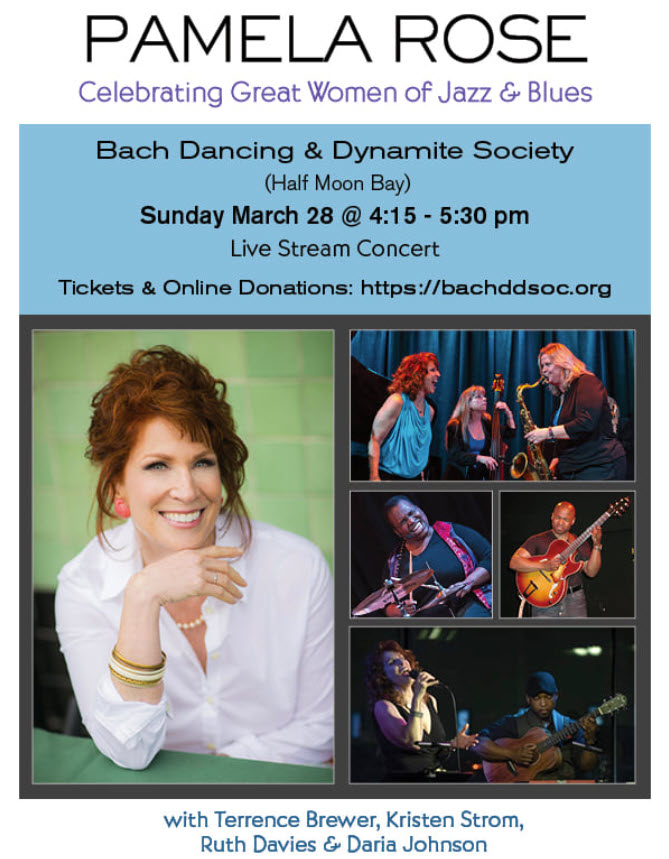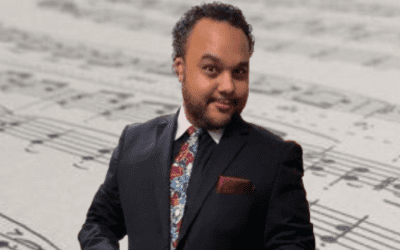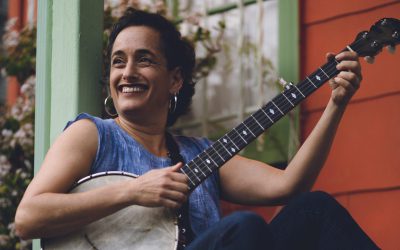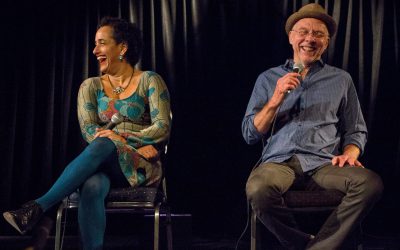Thank you so much for joining part 2 of my conversation with Jazz and Blues Queen, Pamela Rose! We talk about the history of women in the blues and how music shifted when women rose up (and out) and came to the microphone to sing their stories.
To listen to this episode as a podcast, search for Agile Vocalist wherever you get your podcasts.

:16 Why don’t we know who songwriters are? The move away from sheet music
2:21 The culture of white appropriation of black music
5:13 Pamela’s Blues is a Woman show, an ensemble celebration of black womens’ story. Audio used by permission of Pamela Rose and Music in Place.
Preview video of Blues is a Woman.
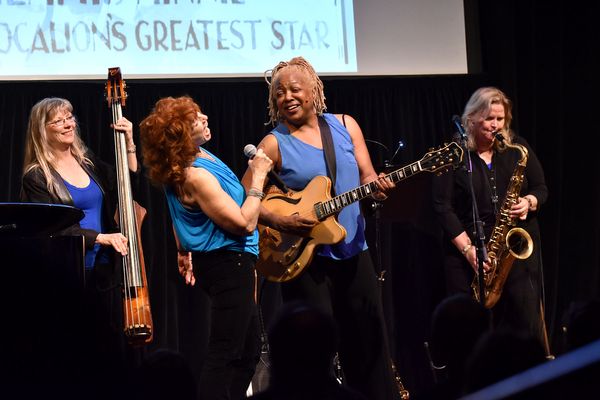 The Blues is a Woman ensemble (left to right): Ruth Davies, bass, Pamela Rose, author & vocalist, Pat Wilder, guitar & vocals, Kristen Strom, saxophone & vocals
The Blues is a Woman ensemble (left to right): Ruth Davies, bass, Pamela Rose, author & vocalist, Pat Wilder, guitar & vocals, Kristen Strom, saxophone & vocals
6:42 Blues musicians stereotype: a man and his guitar
7:50 Bringing the women blues singers to the stage; demand for the blues went crazy
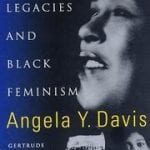
For further reading: a comprehensive history by Angela Davis: Legacies and Black Feminism
10:56 Blues is about freedom and a path out for women
12:55 Post 1915: redefining cultural notions of what women are
13:41 Pamela performing an original she wrote called “Liberator.”
18:12 On teaching her vocal students: people long to be heard
20:34 Singing is massage from the inside
~~~ What do you connect to that truly sparks your joy? ~~~
Pamela teaches vocal classes at the California Jazz Conservatory. Pamela’s next virtual concert is March 28, 2021!
Get your tickets! March 28, 2021 via the Bach Dancing and Dynamite Society, starting at 4:15 p.m. US-Pacific time.
Did you miss part 1 of the interview with Pamela? Check it out here!
Did you enjoy this? Please share it on your socials, leave me a comment, or subscribe for more from Agile Vocalist.
Episode transcript
[Spoken intro: “Listen to this next Agile Vocalist blogcast” + music]
Rachel: I’m curious about one thing and this is more for the novice music audience and you might not have an answer to it is, why is it that we usually know the name of the band or the singer or the song or we’ve heard it before, but why is it that writers and composers and arrangers, unless you’re a musician that’s diving into those charts, you just don’t know who that person is. It’s not just unrecognized women but it’s something about the way that our culture markets and sells music, and it goes way back. I don’t know if do you have any insight into that one because it’s– You do?
Pamela: No, I agree, and I think we’re shallow.
[laughter]
Pamela: We like pop culture.
Rachel: We do.
Pamela: Some of that I’ll say it used to be when we were a sheet music culture before records and gramophones, you always knew who the composers were. Even if the star who made the song famous was there, this was all dictated by– ASCAP was a very powerful union. There were a lot of reasons why we knew about the composers. At some point, we started relating to the songs by the most famous person who did it. I think people always are like that. What gets under my craw these days is if you look up a song that was written by somebody else and you just go online.
They have the lyrics but they’ll say as written by Frank Sinatra or Ella Fitzgerald or Eddie James. , There actually is some copyright issues there and publishing issues that it’s a shame, but they do. You have to dig around to find those things out. That being said, I always urge my singing students to, “Find who wrote this song.”
Rachel: As I’ve dived into some blues, none of it’s Eric Clapton’s and led Zeppelin stole a whole lot. It’s just really shocking. Aerosmith was on there too taking and reworking. It’s just not very rich– It’s shocking when you start to figure out who wrote songs.
Pamela: Yes, and there was a lot of, let’s be clear, a lot of White appropriation of Black music. It’s an interesting little side story and I won’t bore people with it. There were a lot of those British bands who rediscovered our blues and roots music because these two guys Horsed Lippmann and his friend friends somebody started bringing them over for this series of jazz concerts out of World War II where they had been starved, especially in Germany where it was illegal to have jazz or blues record.
They were so hungry for the music and they started inviting them, having these concerts. Because it was Germany, let me tell you that these concerts were filmed for German TV and they were in perfectly pristine condition. Then later they started bringing in blues artists and they discovered a lot of the blues artists that we in , America had forgotten, Muddy Waters and Willie Dixon, and started bringing them over.
Once they started bringing them over, they filmed all of that, and so these young guys were watching it on TV and went to concerts all over Europe. Certainly, everybody in the Rolling Stones did, and The Animals, they were just sitting at the feet of them, and they met a lot of these blues artists. Some of them were more respectful, but the White kids who heard these songs just assumed that their band because everybody was listening to the Beatles who were doing a lot of their own songs. When the Rolling Stones did Little Red Rooster, they just assumed that they’d written it.
Rachel: You want to talk about Blues as a Woman?
Pamela: Right.
Rachel: I guess you started that in 2018. Is that right?
Pamela: Yes, that’s about right.
Pamela: Okay. While I was doing the Wild Women, a song show, because I was a literature major in college. I mean I am a research geek a little bit. As I’m digging into especially the Ida Cox who wrote Wild Women Don’t Sing the Blues, and Ma Rainey and Alberta Hunter, and I started– Which we were talking about in the Wild Women’s song show. I started thinking, “This is really the story I would love to tell.”
I also knew that, I didn’t want to do it the last show where I am the singer. I knew I wanted it to be an ensemble piece. It’s really a Black woman’s story. I sing the Sophie Tucker and Janis Joplin songs. I know a few others but I wrote the show and created it for all the incredible artists that perform with me.
Rachel: Nice.
Pamela: Because I had done Wild Women and I finally understood how hard it is to mount something that, I actually spent a full year grant writing and I got a lot of beautiful support from a lot of foundations to do it. If you’re a blues lover, I am. The first image that is going to come into your mind is a guy and his guitar. I love a lot of those guys in their guitars, I’m a big fan. When you really come down to listen to the women and check out where they were and what they added to it, it was the women who put this music on the map.
There’s no doubt about it. There were so many reasons why that was true. One is because of the recording, we started to switch over to have gramophone records but gramophone records up until that time were still novelties and ordinary people wouldn’t necessarily have them around. You had opera, you had Caruso, you had Borscht Belt Comics, you had things like that. It wasn’t the way you heard music necessarily.
This one guy had this idea because he was seeing that what was tearing up the tent shows and the Vaudeville acts that were going all the way from the South [00:08:00] in these caravans and tents up to the South were these amazing women blue singers, Sippie Wallace and Ma Rainey and Victoria Spivey. They had big voices and they really put a song across, and of course, the great Bessie Smith.
This guy had this wonderful idea and tried to sell it to a whole but he said, “If you put one of those women on a record, you’re going to have an entire new audience of record buyers.” Finally, somebody took them up on that and they issued their first known blues recording and it did pretty well. Then suddenly the floodgates had opened, I mean just open. When Bessie Smith recorded Alberta Hunter’s song a down-hearted blues, I think that was 1924. She actually came a little late, it took him a while to get to her.
It sold 780,000 copies in 6 months, and people were running out to buy gramophones just to hear that because, of course, the amazing thing about a blues singer is that you can’t get that on the sheet music. You can’t get those moans and those slurs. It doesn’t translate and the power of the women is what– Suddenly, blues which we didn’t even think about musically suddenly it was what everybody had to have and wanted the latest blues record. It was the women by far who were driving those record sales.
Internationally, women put Blues on the map. I will also say that there’s a great– Angela Davis book, a great book about feminism and blues lyrics, and is really well worth reading. The things was when you think about it, these women were coming off the farm and the farm, if you were a young Black girl in the South, you pretty much had two options. You were going to live and die on your family’s farm or you’re going to work as somebody’s maid, which is just a domestic service. Which is just a step up from being a slave or you were going to marry and work on his farm. There were terrible options.
So for a few of these women to join the show, to join the caravan and leave and join the showbiz, this was like “your out!” If you could sing and dance, this was your way out of all of that.
Rachel: Wow, yes.
Pamela: Also these women who then started putting on these fancy clothes and feathers and these caravans and pull into town. It was maybe you lived way out in the Delta and this was the big– When this show came into your town, it’s like everybody came, you were excited. You saw this woman who had on her furs and pretend jewellery and she gets up there and sings out a song that reaches into your heart. Also is singing about I don’t have to take it from anymore and I’m going to leave you. These women were singing songs about personal freedom. Blues has always been about freedom. I think that freedom just to complain if nothing else.
Rachel: Right. [laughs]
Pamela: It’s no surprise that blues really popped into our cultural consciousness after the emancipation. I mean suddenly you could express yourself. You could wander around from town to town. Seeing the power of these women who were themselves just a year away from being somebody who had absolutely no freedom and no choices and suddenly there’s summoning up this image of a woman that you as a woman in the audience said, “I want to be like that.” I want to say, “Well, I’m going to kick up my heels if you don’t treat me right. I’m going to leave you and I’m going–“
Suddenly, that was a very different topic than popular songs had been talking about. Women traditionally, the songs pre-1915 were about women were sweethearts, and maybe sisters.
Rachel: There were givers, caretakers and lovers.
Pamela: They were elevated subjects and suddenly, here comes these women and they’re drinking and they’re smoking and they’re fooling around and they’re saying gender is good for the goose honey and I don’t have to take that. It was hugely liberating. I think it changed all of us. I think that’s why the blues so deeply speaks to us even now since I knew we had been talking so much about women and freedom. I recently found this song that I’ve never recorded, I think I played for a couple of people in my life that I wrote in the ’70s. Just can I give you tiny little bit of story about it?
Rachel: Absolutely, please do.
Pamela: It was the ’70s and let’s just say, social and sexual roles were complicated and we were all trying to figure it out. I think that I was trying to make a statement about these little shades of patronism, about being in a relationship. A man is being-
Rachel: Patronising?
Pamela: -patronising. At the same time, I was involved in a radical therapy group. How about that for early ’70s place. The woman who ran it used to say- and I never forgot this- that every woman should have– She said, “You have to have three things. You have to have a couple of friends that you know that no matter what, you could show up on their doorstep in the middle of the night. You have to have $50 saved that’s yours, not your husband’s. You have to have something to believe in.” I loved that.
This was really speaking to women who feel trapped like, “I can’t free myself from a certain–“
Rachel: A bad marriage, whatever, yes sure.
Pamela: I was a pretty young woman, so I wasn’t in any situation like that but here’s what I came up with.
Rachel: Great.
Pamela: It’s called Liberator. [laughs] All right.
[Pamela sings]
I took a drive to Mendocino, you said you wanted to be free
I had a taste of something good but baby, you needed it more than me
I found the buskers by the station, and offered up some harmony
I gave a man a coin whose palm was stretched, he needed it more than me
What happens to a woman, when she’s sent away to
The road to nowhere isn’t paved
At least I’ve got something I believe in
And I’ve got $50 saved
So when you talk about it later and you rewrite this history
Don’t you dare paint yourself my savior
It was not your job to set me free
And don’t call yourself my liberator
You needed it more than me.
Rachel: Oh, that’s awesome. What a wonderful story, thank you. This is my applause. This is how we do applause in digital age. Most people go like this but I’m just different [snaps fingers at camera for applause]. I have some beatnik in my background. [laughs]
Pamela: Clearly.
Rachel: That’s awesome. That’s so awesome. Thank you for sharing that. [00:18:00] What was it? That’s called Liberator, you said?
Pamela: Liberator.
Rachel: Liberator.
Pamela: It only exists in this house and now to your folks.
Rachel: You know I’ve been a student of yours and you’ve had students and they come back and back, what would you say to someone who– everybody says, “Oh, I can’t sing.” Which we know is garbage, right? You hear them they’re like, “You’ve got enough to try.” What would you say to someone who’s thinking about singing, who is doubling around and just too fearful to dive into the creative? What would you say to encourage somebody like that? There’s nothing to lose or? [laughs]
Pamela: I would say that 90% of my students you’re describing right there.
Rachel: Got it.
Pamela: I teach a lot of I call it “my for starters class” because a lot of people fit that bill. I think we need to be heard. I think people long to be heard. Most people even though they’re afraid to sing in public, sing very loudly in the shower or very loudly in their car, right?
Rachel: [laughs]
Pamela: Then many students come when they just reach this age in their life where they just say, “You know what, I just want to do it and I’m afraid but I really don’t care what anybody thinks about anymore.” Maybe they have the experience of your little brother always teased you or somebody told you you couldn’t sing or you stopped. It feels good to just let your voice out. I have had a couple of students and I’ve been teaching for years, who really were truly totally challenged, or rhythm challenged, and that’s the harder thing to teach. Even then, I create a very supportive atmosphere in my class, and we make it so that you feel more and more confident with what you’ve got and can bring it out.
Rachel: That’s great, that’s beautiful.
Pamela: Do it, that’s what I say.
Rachel: Be the best version of you, do it.
Pamela: Yes, do it, and it feels good. There’s been so many studies about what happens to your brain waves when you’re singing or making music. It’s like a massage from the inside or it’s a meditation. It’s really good at calming us. Interestingly, as hard as it is to teach this way, via Zoom during the pandemic, my classes have been packed because I think people more than ever are longing to be heard. Because maybe you’ll spend the whole day just talking to you and your cat, and hiding behind a mask and saying hi to somebody, right? You need to be heard. It’s been interesting. I think of it as spiritual, I really do.
Rachel: Any closing comments you want to make or share? Anything else?
Pamela: If I’m speaking to people who want to let their voices out whether as a songwriter, a performer, or just as an amateur singer, do it. Having something we believe in is the thing that warms us all the time, and connecting to things that really spark our joy is so important. Hey, the world is crazy. Music is one of the things that is keeping the sphere spinning.
[laughter]
Pamela: So more music in your life and create more music. Sing, Sing loudly. Sing out of tune, I don’t care. Just do it.
[Spoken outro: “That was inspiring. Be sure to listen again soon + music]

